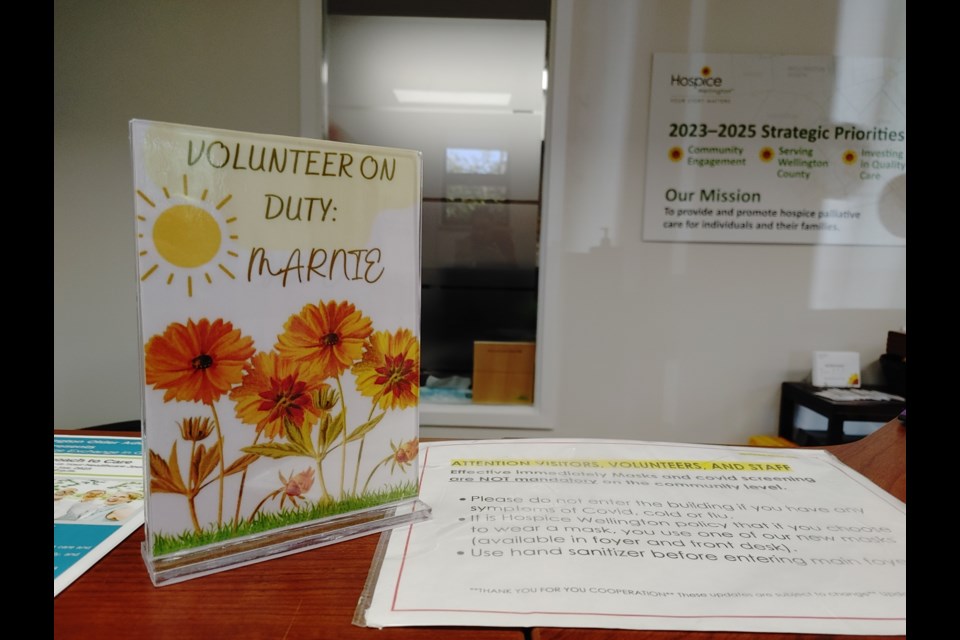WELLINGTON ‒ During her time as director of care at Hospice Wellington, executive director Pat Stuart has provided patients with everything from ponies to parrots, but will always remember when one patient's last wish to sit in a French cafe came to life.
"She had what she wanted it to look like in her head ... so I decided we would set her room up like a little cafe," said Stuart. "It was just unbelievable. We accommodated a beautiful meal and wine for (her and a guest) and it just looked like something out of France."
But with only 10 beds in Hospice and community needs growing every year, while most patients' wishes are manageable, Stuart said without the help of almost 200 volunteers, they'd need to supplement with additional funding from the province, as well as 10 to 15 new staff.
"Every year our numbers are up, our volunteer ranks are growing, we use every inch of this building and we have no space left," said Stuart. “I need more government funding because to come here, versus to go to the hospital, it’s cheaper but the experience costs money."
This is especially true for rural areas like Wellington North, Mapleton and Minto where Stuart said the group is trying to attract more volunteers to provide in-home and community bereavement, palliative, and caregiver support.
According to Stuart, these services involve everything from one-on-one support and companionship to assisting with music and walking groups.
“All these rural areas, they need volunteers and it doesn't make sense to keep sending people from Guelph – it's too far, " said Stuart. "So we thought if we took our show up there, it’ll be easier to engage with people in the area.”
A non-affiliated hospice in Wellington County is being planned, but at this point is in the formative stages.
The leader of the three-year pilot program Hospice Wellington Rural Community Programs, Julie Martin-Jansen, said while they currently have 41 rural volunteers, recruitment continues to pose an issue.
"I think how healthcare is now, we’re all going to have to work together to wrap our services around that person as a community….rather than have the patient and family all over the place trying to find services," said Stuart. “When you think of 10 beds for the population, it's certainly not a lot so we need to start coming up with more ideas on how to keep people at home but provide them with what they need."
A volunteer at Hospice Wellington for 21 years, Donna Core said it's an honour to help the families.
“It looks like (I'm) just here cleaning pens, and I am, but the conversations that happen here at the front desk (are important)," said Core. "Sometimes it's just chit-chat and other times it gets serious and sad and we talk through it."
But at the end of the day, both Stuart and Core agree most volunteers feel they receive "way more" than they give.
"There are so many moments of joy," said Stuart. "One time, we had a (young) patient coming in and they told me he wasn't coming until later in the evening (because) he was (eloping). So I called them and said you're welcome to come here and we can have a wedding for you."
In three hours, volunteers and a couple of staff got together and purchased cake, wine, and flowers; decorating the patient's door with a honeymooner sign, rerouting the minister, and even recruiting a staff member to sing.
"We had all the details and it was so beautiful," said Stuart. "(I remember) when I went to pour a little bit of wine for the newlyweds, the patient looks at me and goes, 'Can I have this?' And I said 'Yes, of course you can, it’s your wedding."
Three days later, Stuart found the patient's wife at the door, holding her wedding bouquet.
"He's gone," said the wife before Stuart remembered the two "shared a good cry."
"But I know that we made a difference (in that man's life) so that's what you have to walk away with," said Stuart. "We can't stop what's happening but we can make a difference in the experience."
All volunteers must be 18+ and complete a 33-hour training course. More information is available here.
Isabel Buckmaster is the Local Journalism Initiative reporter for GuelphToday. LJI is a federally-funded program.



